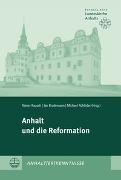- Start
- Anhalt und die Reformation
Anhalt und die Reformation
Angebote / Angebote:
Anhalt wäre ohne die Reformation nicht denkbar. Die Evangelische Landeskirche Anhalts, die heute als einzige Körperschaft des öffentlichen Rechts das historische Land Anhalt noch repräsentiert, hat ihre Wurzeln in der Kirchengeschichte des traditionsreichen Ländchens zwischen Fläming und Harz.
Neben dem Einfluss Luthers war auch derjenige Melanchthons und schließlich Calvins bedeutsam. Als weiterer Faktor für den besonderen Verlauf der Reformationsgeschichte sind die kleinräumlichen Strukturen in Kirche, Staat und Gesellschaft zu nennen, die durch das Selbstverständnis und politische Handeln der Askanier geprägt wurden.
Die einzelnen Entwicklungsphasen, Orte, Bilder und Akteure dieser Reformationsgeschichte - so die Gliederung des Bandes - sind immer wieder behandelt worden. Ihre Erträge werden hier erstmals gebündelt und durch neueste Forschungen sowie zwei gegenwartsbezogene Beiträge ergänzt.
Dass die Erinnerung an die anhaltische Reformationsgeschichte bis heute Identität stiftet, sagt etwas darüber aus, dass kleinräumige Strukturen nicht als Kleinstaaterei abzutun sind, sondern als Chance begriffen werden können.
Mit Beiträgen von Jan Brademann, Joachim Castan, Gerrit Deutschländer, Werner Freitag, Ulla Jablonowski, Helge Klassohn, Kristin Knoblich, Volker Leppin, Johanna Liedke, Matthias Müller, Otto Gerhard Oexle (+), Martin Olejnicki, Ruth Slenczka, Irina Walender sowie einem Ausblick von Kirchenpräsident Joachim Liebig.
Die Reihe ANHALT[ER]KENNTNISSE der Evangelischen Landeskirche Anhalts enthält jeweils Beiträge zu historischen und aktuellen Fragestellungen aus interdisziplinärer Sicht. Regionale Zugänge werden dabei zumeist durch vergleichende und allgemeine Betrachtungen ergänzt. Wissenschaftlich fundiert und eingängig aufbereitet werden von Anhalt aus Kenntnisse und Erkenntnisse vermittelt - daher: ANHALT[ER]KENNTNISSE.
[Anhalt and the Reformation. On the History of the Regional Church in the 16th and Early 17th Century]
Anhalt would not exist without the Reformation. It was because of this movement that the region, rich in tradition and situated between the Fläming Heath and the Harz Mountains, grew closely together. Also the Evangelical Church of Anhalt has its roots in the rather specific church history of the 16th and early 17th century and is nowadays the only statutory corporation that still represents the historic state of Anhalt. In terms of theology, this ecclesiastical history was not only influenced by Luther, but also by Melanchthon and finally Calvin. Furthermore, the small-scale structures of church, state, and society - largely a result of the identity and political actions of the House of Ascania - significantly impacted the unfolding of the Reformation in Anhalt.
The various phases of development as well as the places, images, and stakeholders of this history of the Reformation - which serve as the book's structural elements - have been subject to comparative research time and again. For the first time, the comprehensive results of this research are brought together in this volume, complemented by previously unpublished works.
Noch nicht erschienen, August 2019
